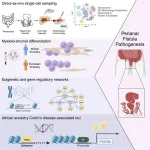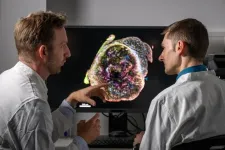(Press-News.org) New research has discovered that neotame, one of the new generation of artificial sweeteners, is capable of damaging the human intestine and causing illness.
The study is the first to show that neotame can cause previously healthy gut bacteria to become diseased and invade the gut wall – potentially leading to health issues including irritable bowel syndrome and sepsis – and also cause a breakdown of the epithelial barrier, which forms part of the gut wall.
The research, which is published in the journal Frontiers in Nutrition and was carried out at Anglia Ruskin University (ARU), demonstrates that neotame can damage the intestinal epithelium directly, by causing the death of epithelial cells, and indirectly, by damaging bacteria commonly found in the gut.
The in vitro study identified a range of pathogenic responses following exposure of E. coli (Escherichia coli) and E. faecalis (Enterococcus faecalis) to neotame, which is found in drinks, foods and chewing gums, including biofilm formation and increased adhesion to and invasion of cells by diseased bacteria.
Some of the newest artificial sweeteners have a 1,000-fold sweeter taste compared to sugar, reducing the amount needed to be added to food and drink. Despite the smaller quantities used, the impact of neotame on the epithelium-microbiota relationship has the potential to cause poor gut health, which in turn could lead to metabolic and inflammatory diseases such as irritable bowel disease or insulin resistance.
This new research into neotame builds on previous work by Dr Havovi Chichger of Anglia Ruskin University (ARU), which discovered that saccharin, sucralose, and aspartame, some of the most widely used artificial sweeteners, could cause similar damage in the gut.
Artificial sweeteners can play a role in helping with weight loss and aiding individuals with glucose intolerance and type 2 diabetes. However, this new study, led by Dr Aparna Shil, of Jahangirnagar University in Bangladesh, and Dr Chichger highlights the need for further research into the toxic effects of some of the artificial sweeteners that have been developed more recently.
Dr Chichger, Associate Professor in Biomedical Science at Anglia Ruskin University (ARU) and senior author of the study, said: “There is now growing awareness of the health impacts of sweeteners such as saccharin, sucralose and aspartame, with our own previous work demonstrating the problems they can cause to the wall of the intestine and the damage to the ‘good bacteria’ which form in our gut.
“This can lead to a range of potential health issues including diarrhoea, intestinal inflammation, and even infections such as septicaemia if the bacteria were to enter the blood stream. Therefore, it is important to also study sweeteners that have been introduced more recently and our new research demonstrates that neotame causes similar problems, including gut bacteria becoming diseased.
“Understanding the impact of these pathogenic changes occurring in the gut microbiota is vital. Our findings also demonstrate the need to better understand common food additives more widely and the molecular mechanisms underlying potential negative health impacts.”
END
Artificial sweetener has potential to damage gut
New research finds neotame can cause healthy gut bacteria to become diseased
2024-04-24
ELSE PRESS RELEASES FROM THIS DATE:
Gene-based therapy restores cellular development and function in brain cells from people with Timothy syndrome
2024-04-24
In a proof-of-concept study, researchers demonstrated the effectiveness of a potential new therapy for Timothy syndrome, an often life-threatening and rare genetic disorder that affects a wide range of bodily systems, leading to severe cardiac, neurological, and psychiatric symptoms as well as physical differences such as webbed fingers and toes. The treatment restored typical cellular function in 3D structures created from cells of people with Timothy syndrome, known as organoids, which can mimic the function of cells ...
MD Anderson Research Highlights for April 24, 2024
2024-04-24
HOUSTON ― The University of Texas MD Anderson Cancer Center’s Research Highlights showcases the latest breakthroughs in cancer care, research and prevention. These advances are made possible through seamless collaboration between MD Anderson’s world-leading clinicians and scientists, bringing discoveries from the lab to the clinic and back.
Recent developments at MD Anderson offer insights into a novel targeted therapy for rare cancers, the role of enhancer RNAs in cell differentiation, novel biomarkers for the prognosis and treatment of pancreatic cancer, imaging signatures to stratify ...
Child pedestrians, self-driving vehicles: What’s the safest scenario for crossing the road?
2024-04-24
Crossing a busy street safely typically is a result of a social exchange. Pedestrians look for cues—a wave, a head nod, a winking flash of the headlights, and, of course, a full vehicle stop—to know it’s safe to cross.
But those clues could be absent or different with self-driving vehicles. How will children and adults know when it’s safe to cross the road?
In a new study, University of Iowa researchers investigated how pre-teenage children determined when it was safe to cross a residential street with oncoming self-driving cars. The researchers found children made the ...
Mount Sinai researchers the first to apply single-cell analysis to reveal mechanisms of a common complication of Crohn’s disease
2024-04-24
Mount Sinai researchers have published the first study to use single-cell analysis in identifying several pathophysiological mechanisms of abnormal passageways in the digestive system known as perianal fistulae, a common complication of Crohn’s disease. These findings were published in the journal Med on April 24.
Crohn’s disease is an inflammatory bowel disease that causes chronic inflammation at any part of the gastrointestinal (GI) tract and impacts more than half a million people in the United States. Perianal fistulae, abnormal connections between the anal canal and perianal skin, are a common complication of Crohn’s disease that often result in ...
Scientists unveil genetics behind development of gliding
2024-04-24
HOUSTON – (April 24, 2024) – People say “When pigs fly” to describe the impossible. But even if most mammals are landlubbers, the ability to glide or fly has evolved again and again during mammalian evolution, in species ranging from bats to flying squirrels. How did that come about? In a study published in the journal Nature this week, a team of researchers led by Princeton University and Baylor College of Medicine explains the genomic and developmental basis of the patagium, the thin skin membrane that allows some mammalian species to soar through the air.
“We don't quite understand how novel traits and adaptations originate from a molecular ...
Safety of ancestral monovalent COVID-19 vaccines in children
2024-04-24
About The Study: In this cohort study of pediatric enrollees across three commercial health insurance databases, statistical signals detected for myocarditis or pericarditis after BNT162b2 (ages 12-17 years) were consistent with previous reports, and seizures after BNT162b2 (ages 2-4 years) and mRNA-1273 vaccinations (ages 2-5 years) should be further investigated in a robust epidemiologic study with confounding adjustment. The Food and Drug Administration concludes that the known and potential benefits of COVID-19 vaccination outweigh the known and potential risks of COVID-19 infection.
Authors: Patricia C. Lloyd, Ph.D., Sc.M., of the Food and Drug Administration in Silver ...
Reversals in the decline of heart failure mortality in the US
2024-04-24
About The Study: This analysis shows that declines in heart failure-related mortality from 1999 to 2012 have been entirely undone by reversals from 2012 to 2021, meaning that contemporary heart failure mortality rates are higher than in 1999. The origins of these reversals preceded the COVID-19 pandemic, although the larger increases in 2020 to 2021 indicate that the pandemic may have accelerated them due to limitations to health care access and possible cardiac involvement.
Authors: Marat Fudim, M.D., M.H.S., of Duke University in Durham, North Carolina, is the ...
Recreational marijuana laws and teen marijuana use, 1993-2021
2024-04-24
About The Study: In this repeated cross-sectional study, there was no evidence that recreational marijuana laws were associated with encouraging youth marijuana use, based on both the logistic regression and interaction-weighted models.
Authors: D. Mark Anderson, Ph.D., of Montana State University in Bozeman, is the corresponding author.
To access the embargoed study: Visit our For The Media website at this link https://media.jamanetwork.com/
(10.1001/jamapsychiatry.2024.0698)
Editor’s Note: Please see ...
Manchester scientists found novel one-dimensional superconductor
2024-04-24
In a significant development in the field of superconductivity, researchers at The University of Manchester have successfully achieved robust superconductivity in high magnetic fields using a newly created one-dimensional (1D) system. This breakthrough offers a promising pathway to achieving superconductivity in the quantum Hall regime, a longstanding challenge in condensed matter physics.
Superconductivity, the ability of certain materials to conduct electricity with zero resistance, holds profound potential for advancements of quantum technologies. However, achieving superconductivity in the quantum Hall regime, characterised by quantised electrical conductance, has proven to be a mighty ...
Tumor cells evade the immune system early on: Newly discovered mechanism could significantly improve cancer immunotherapies
2024-04-24
Tumors actively prevent the formation of immune responses by so-called cytotoxic T cells, which are essential in combating cancer. Researchers at the Technical University of Munich (TUM) and the Ludwig-Maximilians-Universität München (LMU) Hospital have now uncovered for the first time how this exactly happens. The study in the journal Nature provides rationales for new cancer immunotherapies and could make existing treatments more effective. A second paper in Nature confirms the findings.
In cancer, tumors often impair the body's immune response. For example, they can prevent immune cells from perceiving cancer cells as a threat or render them inactive. Immunotherapies aim ...
LAST 30 PRESS RELEASES:
Natural selection operates on multiple levels, comprehensive review of scientific studies shows
Developing a national research program on liquid metals for fusion
AI-powered ECG could help guide lifelong heart monitoring for patients with repaired tetralogy of fallot
Global shark bites return to average in 2025, with a smaller proportion in the United States
Millions are unaware of heart risks that don’t start in the heart
What freezing plants in blocks of ice can tell us about the future of Svalbard’s plant communities
A new vascularized tissueoid-on-a-chip model for liver regeneration and transplant rejection
Augmented reality menus may help restaurants attract more customers, improve brand perceptions
Power grids to epidemics: study shows small patterns trigger systemic failures
Computational insights into the interactions of andrographolide derivative SRJ09 with histone deacetylase for the management of beta thalassemia
A genetic brake that forms our muscles
CHEST announces first class of certified critical care advanced practice providers awarded CCAPP Designation
Jeonbuk National University researchers develop an innovative prussian-blue based electrode for effective and efficient cesium removal
Self-organization of cell-sized chiral rotating actin rings driven by a chiral myosin
Report: US history polarizes generations, but has potential to unite
Tiny bubbles, big breakthrough: Cracking cancer’s “fortress”
A biological material that becomes stronger when wet could replace plastics
Glacial feast: Seals caught closer to glaciers had fuller stomachs
Get the picture? High-tech, low-cost lens focuses on global consumer markets
Antimicrobial resistance in foodborne bacteria remains a public health concern in Europe
Safer batteries for storing energy at massive scale
How can you rescue a “kidnapped” robot? A new AI system helps the robot regain its sense of location in dynamic, ever-changing environments
Brainwaves of mothers and children synchronize when playing together – even in an acquired language
A holiday to better recovery
Cal Poly’s fifth Climate Solutions Now conference to take place Feb. 23-27
Mask-wearing during COVID-19 linked to reduced air pollution–triggered heart attack risk in Japan
Achieving cross-coupling reactions of fatty amide reduction radicals via iridium-photorelay catalysis and other strategies
Shorter may be sweeter: Study finds 15-second health ads can curb junk food cravings
Family relationships identified in Stone Age graves on Gotland
Effectiveness of exercise to ease osteoarthritis symptoms likely minimal and transient
[Press-News.org] Artificial sweetener has potential to damage gutNew research finds neotame can cause healthy gut bacteria to become diseased



